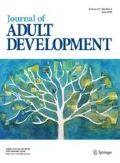Abstract
Theories of postformal thought (PFT) suggest that cognitive development is enhanced by social interactions where differences must be negotiated. Friendships provide the potential for complex social interactions and are an ideal context in which to explore the relation between cognitive development and the negotiation of social differences. The present research is the first to directly explore the relation between close cross-category friendships and level of postformal cognitive reasoning among college students. Participants from two universities completed questionnaires assessing PFT and friendship characteristics. Results indicate that individuals reported more same-category versus cross-category friendships. This was true for sex, ethnicity, social class, sexual orientation, and age. In addition, individuals high in PFT had more social category differences in their existing close friendships than individuals low in PFT.
Similar content being viewed by others
References
Antonio, A. L. (2001). Diversity and the influence of friendship groups in college. The Review of Higher Education, 25(1), 63–89.
Bidell, T. R., & Fisher, K. W. (1992). Beyond the stage debate: Action, structure, and variability in Piagetian theory and research. In R. J. Sternberg & C. A. Berg (Eds.), Intellectual development. NY: Cambridge University Press.
Blackburn, J. A., & Papalia, D. E. (1992). The study of adult cognition from a Piagetian perspective. In R. J. Sternberg & C. A. Berg (Eds.), Intellectual development. New York: Cambridge University Press.
Cacioppo, J. T., Petty, R. E., & Kao, C. F. (1984). The efficient assessment of need for cognition. Journal of Personality Assessment, 48, 306–307.
Canary, D. J., Emmers-Sommers, T. M., & Faulkner, S. (1997). Sex and gender differences in personal relationships. New York: Guilford.
Cartwright, K. B., Galupo, M. P., Tyree, S., & Jennings, J. G. (2009). Reliability and validity of the complex postformal thought questionnaire: Assessing adults’ cognitive development. Journal of Adult Development, 16, 183–189.
Case, R. (1992). Neo-Piagetian theories of child development. In R. J. Sternberg & C. A. Berg (Eds.), Intellectual development (Chapter 6) (pp. 161–196). NY: Cambridge University Press.
Collins, P. H. (2000). “It’s all in the family”: Intersections of gender, race and nation. In U. Narayan & S. Harding (Eds.), Decentering the center: Philosophy for a multicultural, postcolonial, and feminist world (pp. 156–176). Bloomington: Indiana University Press.
D’Souza, D. (1991). Illiberal education: The politics of race and sex on campus. New York: Free Press.
Duck, S. (1991). Understanding relationships. New York: Guilford.
Duster, T. (1991). The diversity project: Final report. Berkeley: Institute for the Study of Social Change, University of California, Berkeley.
Galupo, M. P. (2007). Friendship patterns of sexual minority individuals in adulthood. Journal of Social and Personal Relationships, 24, 139–151.
Galupo, M. P. (2009). Cross-category friendship patterns: Comparison of heterosexual and sexual minority adults. Journal of Social and Personal Relationships, 26, 811–831.
Galupo, M. P., Sailer, C. A., & St. John, S. C. (2004). Friendships across sexual orientation: Experiences of bisexual women in early adulthood. Journal of Bisexuality, 4, 39–53.
Galupo, M. P., & St. John, S. C. (2001). Benefits of cross-sexual orientation friendships among adolescent females. Journal of Adolescence, 24, 83–93.
Hall, R., & Rose, S. (1996). Friendships between African-American and white lesbians. In J. S. Weinstock & E. D. Rothblum (Eds.), Lesbian friendships (pp. 165–191). New York: New York University Press.
Hays, R. (1989). The day-to-day functioning of close versus casual friendships. Journal of Social and Personal Relationships, 61(1), 21–37.
Hooks, B. (1984). Feminist theory: From margin to center. Cambridge, MA: South End Press.
Labouvie-Vief, G. (1990). Modes of knowledge and the organization of development. In M. L. Commongs, C. Armon, L. Kohlberg, F. A. Richards, T. A. Grotzer, & J. D. Sinnott (Eds.), Adult development, Volume 2: Models and methods in the study of adolescent and adult thought (Chap. 3, pp. 43–62).
Labouvie-Vief, G. (1992). A neo-Piagetian perspective on adult cognitive development. In R. J. Sternberg & C. A. Berg (Eds.), Intellectual development. New York: Cambridge University Press.
McCall, L. (2005). The complexity of intersectionality. Signs: Journal of Women in Culture and Society, 30(3), 1771–1800.
McPherson, M., Smith-Lovin, L., & Cook, J. M. (2001). Birds of a feather: Homophily in social networks. Annual Review of Sociology, 27, 415–444.
McWilliams, S., & Howard, J. A. (1993). Solidarity and hierarchy in cross-sex friendships. Journal of Social Issues, 49, 191–202.
O’Meara, D. (1989). Cross-sex friendship: four basic challenges of an ignored relationship. Sex Roles, 21(7/8), 525–543.
Page-Gould, E., Mendoza-Denton, R., & Tropp, L. R. (2008). With a little help from my cross-group friend: Reducing anxiety in intergroup contexts through cross-group friendship. Journal of Personality and Social Psychology, 95(5), 1080–1094.
Piaget, J., & Inhelder, B. (1969). The psychology of the child. (Helen Weaver, Trans.). New York: Basic Books (Original work published 1966).
Price, J. (1999). Navigating differences: Friendships between gay and straight men. New York: Harrington.
Rose, S. (1985). Same- and cross-sex friendships and the psychology of homosociality. Sex Roles, 12, 63–74.
Rose, S., & Serafica, F. C. (1986). Keeping and ending casual, close and best friendships. Journal of Social and Personal Relationships, 3(3), 275–288.
Sinnott, J. D. (1998). The development of logic in adulthood: Postformal thought and its applications. New York: Plenum.
Sternberg, R. J., & Berg, C. A. (1992). Intellectual development. New York: Cambridge University Press.
Suttles, G. (1970). Friendship as a social institution. In G. McCall (Ed.), Social relationships. Aldine: Chicago.
Author information
Authors and Affiliations
Corresponding author
Rights and permissions
About this article
Cite this article
Paz Galupo, M., Cartwright, K.B. & Savage, L.S. Cross-Category Friendships and Postformal Thought among College Students. J Adult Dev 17, 208–214 (2010). https://doi.org/10.1007/s10804-009-9089-4
Published:
Issue Date:
DOI: https://doi.org/10.1007/s10804-009-9089-4




